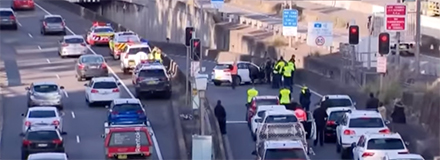Blockade Australia activities which stopped Sydney peak hour traffic on 27 June 2022 is an experience which timber harvesting contractors have been confronting for years. Source: Australian Rural & Regional News
In the week ended 5 August 2022, on five successive days, protestors entered timber harvesting sites in Northern NSW and placed their personal safety in danger to such an extent that work ceased.
There is no urban media coverage of such events. The Victorian Government, confronted with the same problem of human safety on work sites of forestry operations, has legislated the Sustainable Forest Timber Amendment (Timber Harvesting Safety Zones) Act 2022 (No.31 of 2022).
The Act establishes approved harvesting sites as Timber Harvesting Safety Zones and sets up statutory authority for a direction to leave a Timber Harvesting Safety Zone (section 4), direction to stop or move a vehicle in a Timber Harvesting Safety Zone (section 5), direction to remove a dog from a Timber Harvesting Safety Zone (section 6), a requirement to give name and address (section 10) and created an offence, amongst others, to hinder, obstruct or interfere with a timber harvesting operation (section 17).
Most offences carry a 60-unit penalty. Timber Harvesting Safety Zones are those areas approved by the government under the respective legislation for the harvesting of native forest timbers or plantations.
It seems appropriate for the NSW Parliament to consider also legislation which creates a safe workplace for forestry operations or plantations operations.
The Work Health and Safety Act 2011 (NSW) provides a framework to protect the health, safety and welfare of all workers and others in relation to NSW workplaces and work activities.
The site of a forestry operation under the Forestry Act 2012 (NSW) or the Local land Services Act 2013 (NSW) or plantation operations under the Plantations and Reafforestation Act 1999 (NSW) is a workplace as defined by section 8 of the Work Health and Safety Act 2011 (NSW).
A worker, as defined in this legislation, includes a contractor, an employee. A police officer is also defined as a worker. A police officer who might attend a protest at a forestry operation or plantation operation is a worker for the purposes of NSW health and safety legislation.
The Victorian legislation is a welcome precedent for NSW, but it has one major flaw. The funding and organisation for forest workplace protests is in most circumstances provided through environmental not for profits who usually have charitable status under State laws and Commonwealth legislation and Deductible Gift Recipient (DGR) status under the Income Tax Assessment Act 1997 (Cth). Legislating for offences against individuals does not capture the organization.
A measure, whilst difficult in proof to be successful, but still a deterrent, is to have civil actions against entities, which, whilst not on site, are associated with the protest at a forest operation workplace.
Such a measure could permit the landowner or the person or entity working in the forest operation workplace to commence a civil action for damages against such a protestor supporting, aiding and abetting organization or to gain a penalty award similar to the individual penalty regime in the Victorian legislation.
A penalty unit regime would have greater deterrence to an organization registered under the Australian Charities and Not-for-profits Commission (ACNC) compliance regime than a monetary penalty. A penalty point award linked to the compliance regime of the ACNC threatens DGR status and charitable status. This has effective teeth in a compliance and enforcement regime.
Currently trespass is a difficult common law action to run, and a cause of action needs to be established. This is particularly so as organisations fostering climate or forest protests usually are structured to as far as possible guarantee a nil return in any adverse civil enforcement process. As is the example of Blockade Australia.






